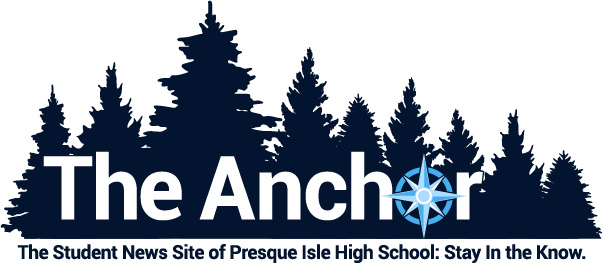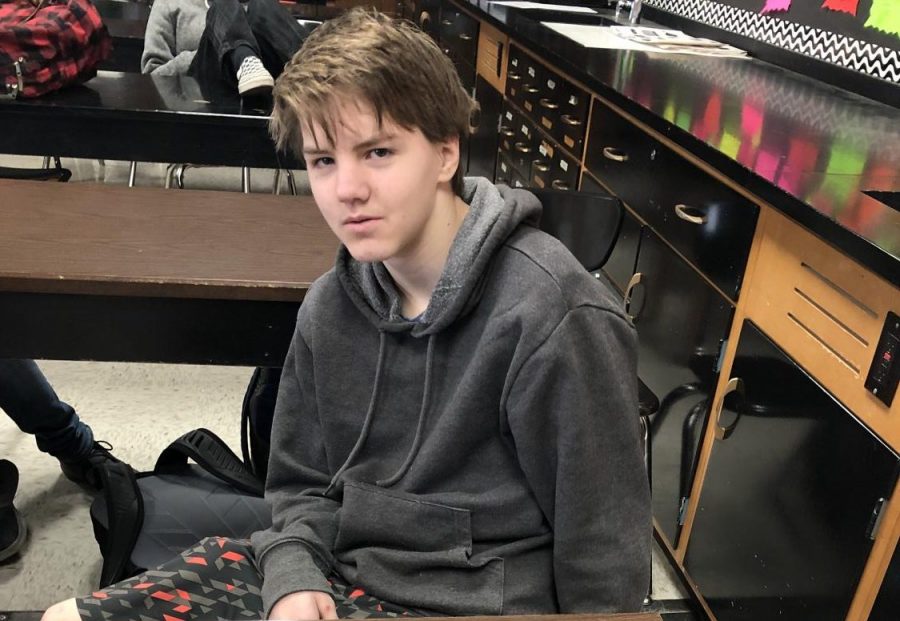Attempts to Prevent Failing Cause Frustrations
Programs designed to support students aren’t always popular
Collin Inman ’22, sits at his desk after sharing his frustrations about being assigned to Academic Recovery, an after school program designed to help students. Inman feels differently about it. “It doesn’t help,” Inman said.
May 16, 2019
It’s 2:40 p.m., the PIHS halls start to empty as kids make their way to the plans they have after school. For freshman Colin Inman, however, he makes his way to Mrs. Lapointe’s classroom to finish an assignment he hadn’t yet completed.“It’s a waste of time,” Inman said, his reaction more annoyed than appreciative.
Academic Recovery (AR) is an after school program that is usually supervised by Mrs. Lapointe. Students are assigned to it by their teachers if they are missing any work. AR was put in place four years ago. “There were frustrations from the teachers because their students weren’t completing their work,” said Ben Greenlaw, PIHS principal. “To help the situation, a group of teachers met and came up with Academic Recovery.”
The afterschool program takes place every Monday and Thursday. “About seven to ten are assigned, and about three or four actually show up,” said Lapointe. AR is typically used when the students don’t have a study hall during which to make up the missing assignments.
Since Inman doesn’t do his work in English, his teacher usually follows up by assigning him to AR. “But it doesn’t help me,” Inman said. “I can get by without doing any work because she doesn’t check, and I just don’t want to do it.” However, Lapointe clarified, “Kids aren’t allowed to leave until they get the work done or until 4:30, which ever come first,” said Lapointe.
The other newer means of helping students stay accountable for missing assignments is Structured Study Hall. This takes place during school hours and is supervised by new PIHS employee Renee Bragdon, “It’s an opportunity for kids to make up missed work due to absences or if they have late assignments,” Bragdon said. There’s a school wide spreadsheet teachers access to assign their students. Mrs. Bragdon organizes it and study hall teachers are supposed to check the spreadsheet and send those kids to the computer lab during that period. “There have been about 500 entries – seven or eight per day,” said Mrs. Bragdon.
“Our first choice is Structured Study Hall, but if kids don’t have a study hall they can be assigned to Academic Recovery,” Greenlaw said. “We understand that kids have after school commitments like sports, watching a siblings, jobs.” Students are able to do SSH during school hours, it’s less stressful for them to find a ride home, and they don’t have to worry about a more serious consequence for missing it. “However, not all students have study halls and that’s why they get sent to Academic Recovery,” Greenlaw said.
Out of these two programs, kids tend to like Structured Study Hall (SSH) better than AR. Aidan LaFrancois ‘19 used to get slips to AR his junior year. “Every time I would get one in homeroom, I’d find the work that I was being sent to AR for and do it in study hall instead,” LaFrancois said. “So in a way, it made me do the work, but only because I didn’t want to go.”
Lapointe feels that AR could be beneficial to students if they are willing to use it right. “What is important for kids to remember is that AR itself is not a punishment,” Greenlaw said. “It’s a place to get extra help.” What gets students in trouble is not showing up for it after school. “It’s like a treadmill: we start the year trying to be strict, but we don’t want to nail the kids,” Greenlaw said. “If you don’t show up, you get noon detentions, the second time it’s in-school suspension, and the third time it’s a Friday detention.”
Because it’s during the school day, it can be easier to connect with students during Structured Study Hall. However, it can be challenging to track those students down if study hall teachers don’t check the school wide spreadsheet at the start of the study hall period. “I check the list once or twice a week, honestly, but Mrs. Bragdon is so good about calling or emailing me for students she needs that I don’t’ usually have to,” said social studies teacher Zachary Powers.
“I do feel like it’s beneficial,” Bragdon said. “It gives kids another adult to help organize and communicate between teachers and students.”
The students and teachers have had the chance to see improvements in their grades because of AR and SSH. These two programs are meant to be support for students. “They’re benefits that students don’t take enough advantage of,” said Greenlaw.

